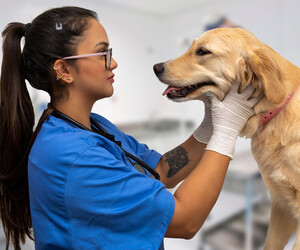Animal Hospital Greensburg: The Perfect Place for Comprehensive Animal Wellness
Animal Hospital Greensburg: The Perfect Place for Comprehensive Animal Wellness
Blog Article
Professional Tips for Pet Nourishment From a Veterinarian
Understanding the dietary demands of pet dogs is crucial for their total health and durability. Veterinarians advise a well balanced diet that provides to private elements such as breed, task, and age level. Yet, with the plethora of animal food choices offered, pet proprietors typically discover themselves navigating a landscape rife with false information and myths. As we discover vital tips from veterinary specialists, it ends up being noticeable that appropriate nourishment is not simply concerning what is fed but includes a much deeper understanding of each animal's one-of-a-kind needs. What crucial understandings could transform your approach to pet dog nutrition?
Understanding Nutritional Demands
Comprehending the nutritional demands of animals is fundamental to ensuring their total wellness and health. Much like people, family pets require a well balanced diet regimen that provides essential nutrients, consisting of proteins, fats, minerals, carbs, and vitamins. These nutrients play vital duties in different bodily functions, such as energy manufacturing, immune reaction, and tissue repair.
They are composed of amino acids, some of which are vital and must be acquired from food. Carbs serve as a primary power resource and can sustain gastrointestinal wellness when they consist of fiber.
Each pet dog may have unique demands based on elements such as age, type, activity level, and health and wellness status. It is vital to consult with a vet to determine the specific dietary needs customized to your pet dog's individual requirements, ensuring they obtain ideal nutrition throughout their life phases.

Picking the Right Food
It is important to think about elements such as age, health and wellness, dimension, and breed condition when choosing a family pet food. Elderly family pets may profit from foods made to address age-related concerns, such as joint wellness or weight management.
When examining pet food choices, look for items that meet the Association of American Feed Control Officials (AAFCO) requirements, which make sure that the food provides complete and balanced nourishment. Active ingredients should be high-quality, with real meat as the primary source of protein. Prevent foods with extreme fillers, synthetic additives, or by-products, as these can take away from the general nutritional value.
Consulting with a veterinarian can offer tailored referrals based upon your pet dog's specific demands. Furthermore, transitioning between foods must be done progressively to stay clear of stomach trouble. By taking these actions, family pet proprietors can make sure that they are offering their fuzzy buddies with the best possible nourishment for a healthy and satisfied life.
Typical Myths About Pet Dog Food
Debunking misconceptions surrounding pet food is vital for making sure ideal nourishment for our fuzzy buddies. One widespread myth is that all grain-free diet plans are exceptional for animals.

In addition, lots of pet proprietors think that "costs" or "natural" tags guarantee better. These terms are often uncontrolled and do not necessarily indicate exceptional nutritional value. It is crucial to scrutinize active ingredient lists and dietary profiles rather.
Unique Considerations for Various Types
When it involves pet nutrition, unique considerations have to be considered for various types, as each breed can have distinct nutritional needs and sensitivities. Huge types such as Wonderful Danes and Saint Bernards are vulnerable to bone and joint problems and might benefit from diet plans formulated to sustain joint health, commonly featuring active ingredients like glucosamine and omega fatty acids. Conversely, small types like Chihuahuas may call for greater calorie densities to satisfy their power degrees, demanding solutions that are rich in nutrients yet lower in bulk.
Furthermore, specific breeds might be predisposed to specific wellness problems, such as food allergies or sensitivities. Types like Labrador Retrievers might deal with excessive weight, needing careful section control and a well balanced diet plan to keep a healthy and balanced weight. On the other hand, types such as Dachshunds may be more susceptible to spinal problems, triggering a need for diet plans that advertise spine wellness and weight monitoring.
Eventually, recognizing these breed-specific nutritional requirements is vital for animal owners. Consulting with a veterinarian can assist in picking one of the most appropriate diet tailored to a specific animal's age, health and wellness, and type condition, guaranteeing optimum nourishment and health.
Importance of Routine Vet Check-Ups
Understanding the special nutritional demands of different breeds is just one element of accountable family pet possession; regular vet check-ups play an essential duty in maintaining overall health and wellness. These examinations are necessary for very early discovery of health and wellness concerns, making sure that any kind of possible problems are attended to before they come to be significant. Normal check outs permit veterinarians to check your pet's weight, dental wellness, and important indicators, which are essential indicators of overall health.
Furthermore, regular check-ups allow vets to offer tailored dietary suggestions based upon your animal's individual wellness condition - Vet Greensburg. As family pets age, their dietary requirements may change, and adjustments may be necessary to stop weight problems or nutrient deficiencies. Preventative treatment, consisting of inoculations and parasite control, is additionally a basic element reference of these gos to, safeguarding your pet dog from numerous diseases
Along with physical examinations, these consultations supply an outstanding possibility for pet owners to review behavioral modifications or concerns concerning their pet dog's eating routines. By prioritizing regular vet exams, family pet owners can make sure a much longer, much healthier life for their fuzzy buddies, inevitably enhancing their lifestyle.
Final Thought
To conclude, ensuring optimal family pet nourishment calls for a thorough understanding of individual dietary needs, ideal food choice, and recognition of common myths. Unique considerations for various breeds should be represented, and routine vet exams play an important role in monitoring wellness and nutritional modifications. Following AAFCO criteria and speaking with vets prior to making nutritional adjustments will sites certainly boost the well-being of pet dogs, inevitably adding to their long life and quality of life.
With the wide range of pet food options readily available, pet proprietors usually find themselves browsing a landscape raging with misinformation and myths. Each animal may have unique requirements based on factors such as age, type, activity degree, and wellness status. It is vital to think about aspects such as age, size, wellness, and type standing when choosing a family pet food. Elderly family pets might benefit from foods designed to deal with age-related problems, such as joint wellness or weight monitoring.
Recognizing the unique nutritional requirements of different breeds is only one element of liable family pet ownership; routine veterinary exams play a vital role in maintaining general health.
Report this page